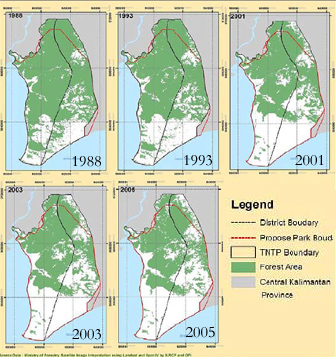UN: 98% of Indonesia’s rainforests gone in next 15 years
98% of orangutan habitat gone in next 15 years
Rhett A. Butler, mongabay.com
June 11, 2007
Indonesia is losing more than 2.1 million hectares (5.2 million acres) of forest a year to illegal loggers, states a new report from the U.N. Environment Program (UNEP). The report, which estimates the value of illicit timbering at $4 billion annually, warns that 98 percent of Indonesia’s lowland forests will be gone by 2022, putting species like the orangutan at risk of extinction in the wild.
The report, Last stand of the Orang-utan: State of Emergency, was released Monday at the Convention on International Trade in Endangered Species meeting in The Hague.
Last Stand said that illegal loggers operate in 37 of Indonesia’s 41 national parks and that up to 88 percent of all Indonesian timber is illegally harvested. Further pressure comes from expanding oil palm plantations used to produce biodiesel. Surging international demand has lead to an explosion of land-clearing for plantations, which by early 2007 covered more than 6 million hectares in Indonesia and 4 million in Malaysia. Associated land-clearing using fires releases so much carbon dioxide that Indonesia now ranks as the world’s third largest emitter of greenhouse gases despite having only the 22nd largest economy.
Orangutans at risk

Orangutan in Kalimantan (Indonesian Borneo). By Rhett A. Butler Indonesian forest fire. Courtesy of UNEP |
The report warned of dire consequences for orangutans, populations of which have fallen dramatically over the past century. Today the great red apes are only found on the islands of Sumatra (7,000 orangutans) and Borneo (50,000 orangutans).
“We are observing illegal trade in live orang-utans as a bi-product of the illegal logging,” said Melanie Virtue, who leads the Great Apes Survival Project Partnership (GRASP) at UNEP, a program to protect the world’s great apes. “When the forests are burnt or cut down, mothers are often killed while the juveniles are caught to be used as pets, or sold on to zoos or safari parks.”
“It is very clear from what is jointly conducted by CITES and GRASP, that there is a highly organized structure of illegal trade in orang-utans,” added Willem Wijnstekers, Secretary General of CITES. “Consequently, there needs to be much higher law enforcement priority allocated to combating this destructive criminality. Such priority needs to come not only from Indonesia, but from the countries importing illegal timber and orang-utans”.
The report blamed governments for failing to crack down on illegal logging, noting that timber importing countries like the United States, China, Malaysia, and members of the EU are as much at fault as Indonesia.
“Indonesia cannot and should not have to deal with this issue alone. It requires resources from the international community to support the efforts of the authorities including the wardens on the ground. Indonesia also needs assistance from the timber trading and importing nations including improved policing and customs operations,” said UNEP Executive Director Achim Steiner.
“The rate of decline of the forests is the most alarming we have seen yet anywhere in the World,” added Christian Nellemann, a lead author on the Rapid Response report. “The real blame lies on the countries buying the timber and wood products from illegal sources. The stepping up of law enforcement in Indonesia is a very encouraging step indeed, but governments in importing countries bear a direct responsibility for the crisis”.
Looking for answers
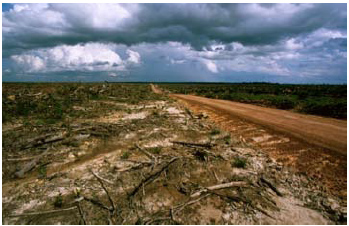
Foresty clearing in Indonesia. Courtesy of UNEP |
The report set forth a series of recommendations to slow forest loss in Indonesia, including strengthening forestry law enforcement in Indonesia by boosting funding and training for rangers; improving international monitoring of timber and wildlife trafficking; removing illegal plantations, mining, and agricultural developments inside national parks; and improving coordination between Indonesian officials and international entities to help recover national parks devastated by illegal encroachment.
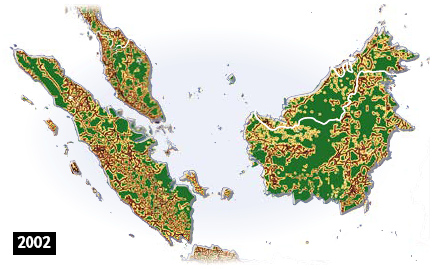 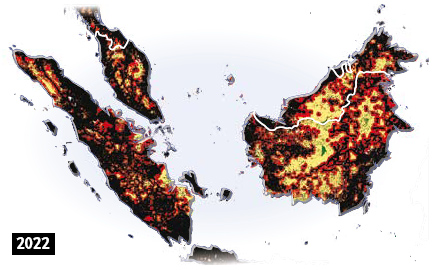 
Projected human impact in Indonesia and Malaysia in 2002 and 2022. Courtesy of UNEP |
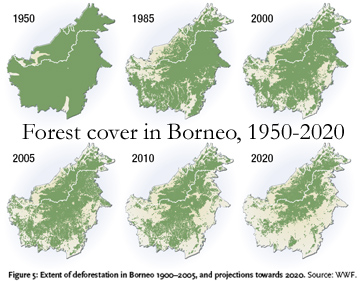
Past and projected forest cover in Borneo and Tanjung Puting National Park (Kalimantan). Modified from the UNEP report |
Related articles
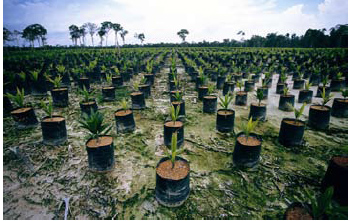
Beginnings of an oil palm plantation. Courtesy of UNEP |
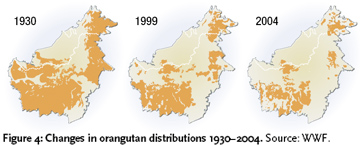
Past and projected orangutan habitat. Courtesy of UNEP

